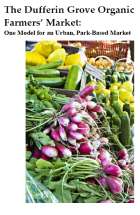
Pages in this Folder:

Related Folders:
See also Department Site Map
Publications:
Market-related videos
Comments?
For the basics, see
- Website & Privacy Policies
- How To Get Involved
- The Role of the Park
Search options:
Department Site Map
Custodians:
posted on May 06, 2008
Poultry in motion: Chickens adopting urban lifestyle
You can raise them in New York but not here. Toronto locavores are hoping to change that
Lucky Clucky feasts directly from the bowl of plenty while
behind her Sally and Heidi forage on the backyard lawn.
The chickens are illegal in Toronto,
a situation their owner is hoping to change.By: Leslie Scrivener
Published: May 04, 2008
Source: Toronto StarIt's an idyllic scene in a sunny backyard in North Toronto. The forsythia is bright as springtime, and Sally, Heidi and Clucky wander by contentedly. They are plump, vigorous, egg-laying hens that, despite their beauty and utility, are illegal in Toronto.
Nonetheless, their owner has kept them quietly in her backyard coop through the winter and now lets them range freely in the yard, which is shallow but 15 metres wide.
"It makes total sense to me, rather than getting in the car, driving to the grocery store and buying eggs trucked in from a far away farm, to go to the back yard and get eggs," says "Alice," who asked that her real name not be used. A middle-aged mother of two teenagers who works at home in the food business, she had identified herself on the telephone as a "renegade" chicken owner. "Besides, I know they are healthy and what they've eaten."
Toronto bylaws forbid keeping poultry, for health reasons. On the other hand, pigeons raised for sport are allowed, provided they rest, roost or perch only on their owner's property.
Oddly, by raising a few chickens in the city, Alice is in step with a do-it-yourself food movement that is thriving in cities like New York, Portland, Chicago and Seattle. It's legal to keep chickens in those cities and dozens more in the United States. INCREASINGLY, urbanites concerned about food miles and safety are pushing their local governments to be more flexible about backyard livestock. Websites, including backyardchickens.com and TheCityChicken.com, offer direction and inspiration to city farmers. When Elaine Belanger launched the first issue of her magazine Backyard Poultry in 2006, she had 15,000 copies printed, which proved to be not nearly enough. "People kept asking for them," she says from Eau Claire, Wis. "Now we have 50,000 paid subscribers. It's truly beyond what we were expecting."
She believes the interest has been spurred by post-9/11 fears, recent scares about E. coli in meat, and distrust of additives in food. "People want a little bit of control."
Closer to home, Waterloo city council recently agreed to study a proposal from Matthew Bailey-Dick and a new organization he had formed, the Waterloo Hen Association. "We didn't want to quietly do our own thing on our property," says Bailey-Dick, a Mennonite peace educator and father of three young children who doesn't yet raise chickens. "This is a community issue and an opportunity to realize they can contribute to practical food security.
"There are broader issues ... food prices going up, global warming and environmental sustainability, which one family cannot solve."
Here in Toronto, it's not known just how many residents keep chickens in their backyards. One recent afternoon, Alice's birds cluck pleasantly as they peck and hunt in the grass." They're in chicken heaven, since the weather's been nice and we've been letting them out of their coop," she says. Their coop, a U.S. product called an "Eglu," is made from stylish moulded plastic, includes a wire run, and sells for about $500.
Alice has launched an online forum at torontochickens.com, which includes a petition asking Toronto to update its bylaw to allow residents to responsibly raise chickens in the city.
She contends there are worse sources of city noise than a few chickens. During an interview with the Toronto Star, she noted a plane flying overhead and a roaring leaf blower across the street. She's an environmentalist interested in living sustainably.
"Properties are mainly used to grow grass," she says, "and we use our drinking water to water grass, and pesticides to get rid of bugs and weeds, and chemicals to fertilize the grass, and then we collect leaves and put them in bags when they could be used for mulch and as a good source of carbon for the compost."
Alice also subscribes to the "locavore" movement, which includes growing your own food or buying only food raised locally. She grows garlic, alpine strawberries, sorrel and other herbs in her front garden. She worries about contaminants in food and about factory-farm production and the resulting runoff from manure. She uses her chicken manure as a resource, a source of nitrogen in the garden.
Matthew Bailey-Dick of Waterloo and his wife, Nina, would like to raise a few chickens on their 18- by 49-metre property in Waterloo. They already have a large garden and preserve or freeze a lot of their harvest.
WATERLOO DOESN'T have a bylaw regulating chickens, and after Bailey-Dick's presentation April 21, council agreed to review and update its animal control bylaw.
In recent months, two families in Halifax have had to give up their chickens because of complaints from neighbours – one over a noisy rooster and the other claiming chickens were attracting rats. Those chicken owners are calling for bylaw amendments. Meanwhile, in Chicago, there's been an uproar since councillors tried to amend a bylaw in order to ban chickens last December. In the interests of keeping the peace, they've decided to review the regulations.
Christie Young, director of Guelph-based FarmStart, an organization that supports new farmers, is confident that small-scale poultry production can work in the city. Bylaws can limit the number of birds and the minimum distance from a neighbour's property, she says. Owners would be responsible for chicken waste, just as citizens are for waste from their pets, and required to build coops strong enough to keep chickens in and predators out.
(In Niagara Falls, for example, rules for keeping chickens include minimum property size of 30 by 12 metres, no more than 10 chickens per yard and no roosters.)
York University graduate student Carolyn Young, who has written a research paper on raising chickens in the city, says giving it the green light in Toronto could be "a very smooth process ... "it works in (other cities) in North America and it works in other countries."
Still, she noted, there is the problem of attitude. "There continues to be a mindset that chickens are dirty, a nuisance and disorderly when kept in the city."
Keeping backyard chickens was more common in Toronto a generation ago, especially among immigrant families from Portugal and Italy. But concerns about public health and the possibility of disease being spread by chickens led to a change in the bylaw in 1983, recalls deputy mayor Joe Pantalone. "It was a big debate, and I was on the losing side. I was of the view that allowing the farm to be part of the city is part of the holistic solution ...
"Rabbits were spared because somebody brought in a cuddly little thing to the committee meeting. Pigeons were a bit tricky. If they were kept for food, they were banned, but they were allowed for sport."
Pantalone, councillor in Ward 19, says the time is right to take another look at the bylaw. "But it doesn't make sense to keep chickens on the balcony of your condominium. However, there's something to be said if you have a big back yard abutting a ravine where you keep a limited number of animals in clean condition."
Chickens are banned in Toronto because they are considered farm animals. "Because of the urbanized environment and the density of houses, farm animals are not appropriate and not allowed," says Fiona Venedam, supervisor of Toronto animal services, north.
However, there are a few places in the city, including parts of Scarborough near the zoo, that are zoned agricultural and where chickens are permitted.
Each year, there are only a few complaints about chickens being kept in the city. Violators face a $240 fine. Recently in a west downtown ward, however, there have been complaints about people barbecuing pigeons. "If only they were looking for people who are raising pigeons, I would turn my neighbour over without hesitation," one west-end resident wrote in response to a Star inquiry.
Rhonda Teitel-Payne, urban agriculture manager for The Stop Community Food Centre, says there's a perception problem about raising food in a place like Toronto – "the city is 100-per-cent toxic and the country is 100-per-cent clean." That view is changing as people turn their minds to roof-top gardening, boards of education reopen greenhouses in local schools, and residents try to secure plots in community gardens which, she says, is difficult. "It's very hard to do, we are inundated with requests."
Free-range eggs are the first things to sell out at farmers' markets, she adds.
"The demand is there, and people are getting to the point where they say, 'I'm going to try and do something myself.' "
Back in North Toronto, Alice's three birds cluck soothingly in the backyard. Each bird lays an egg a day – actually, one every 26 hours. Today's offerings, in muted shades of brown, are sitting prettily in a small straw basket sitting on the patio table.
GETTING TO KNOW YOUR GALLIFORMES
Hoping to raise a few chickens in your Toronto backyard? Wondering what you can and can't do?
The City of Toronto lays it all out on its website (cityoftoronto.ca) but you may want to consult a book of taxonomy before you start looking.
The website has a convenient Frequently Asked Questions section on animals, where it promises information on chickens, pigeons, exotic animals and more in Chapter 349-2 of the Toronto Municipal Code. But once you get there, you won't find the word chicken or poultry mentioned anywhere.
Clicking on Schedule A brings up a long list of prohibited animals. Proboscidae (elephants) and Viverridae (which include mongooses) are banned. So are Perissodactyla (horses, donkeys, jackasses, mules). Under birds there are Anseriformes (ducks, geese, swans, screamers), Struthioniformes (flightless ratites such as ostriches, rheas, cassowaries, emus, kiwis) and Galliformes (such as pheasants, grouse, guineafowls, turkeys)
Chickens, though not named, belong to the Galliformes scientific order and are prohibited.
Other jurisdictions
• Victoria, B.C. is one of the few cities in Canada where it is legal to keep chickens. They may be kept as pets and for egg production, though the eggs may not be sold. Roosters are banned. The bylaw doesn't limit the number of chickens, but an "excessive" number "will bring into question intended use."
• The Niagara Falls, Ont., bylaw is more specific: A maximum of 10 chickens; coops must be at the backyard, 7.6 metres from the rear property line and 4.6 metres from the side lot line. Roosters are banned. The coop must allow for proper ventilation and for movement of chickens in keeping with good animal husbandry practices.
• In New York City, poultry and rabbits are allowed by permit under the city's Health Code. They must be kept in coops and runs, which must be whitewashed or similarly treated once a year. The coops and runs must be kept clean.
|
Read more News. | ||





 Printer friendly version
Printer friendly version
